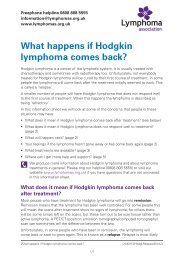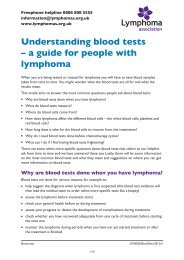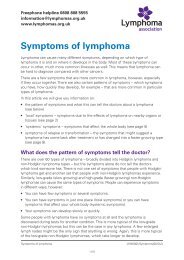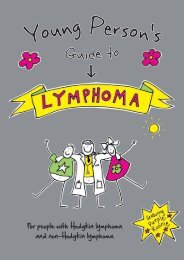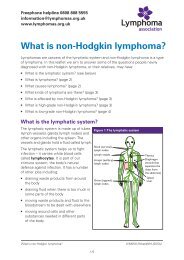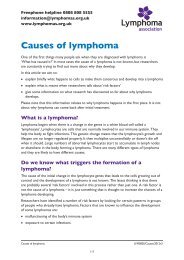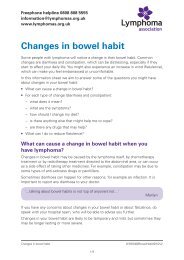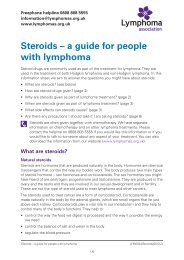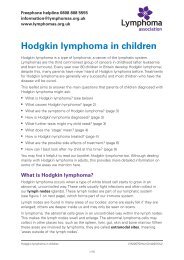How to eat well with lymphoma - Lymphoma Association
How to eat well with lymphoma - Lymphoma Association
How to eat well with lymphoma - Lymphoma Association
You also want an ePaper? Increase the reach of your titles
YUMPU automatically turns print PDFs into web optimized ePapers that Google loves.
Freephone helpline 0808 808 5555<br />
information@<strong>lymphoma</strong>s.org.uk<br />
www.<strong>lymphoma</strong>s.org.uk<br />
<strong>How</strong> <strong>to</strong> <strong>eat</strong> <strong>well</strong> <strong>with</strong> <strong>lymphoma</strong><br />
Eating a <strong>well</strong>-balanced diet is essential for everybody <strong>to</strong> maintain good health and<br />
fitness, but it is all the more important when you have <strong>lymphoma</strong>. If you are already<br />
<strong>eat</strong>ing healthily, you might not need <strong>to</strong> make many changes <strong>to</strong> your diet and you<br />
should continue <strong>to</strong> <strong>eat</strong> as normal.<br />
<strong>How</strong>ever, having <strong>lymphoma</strong> might change how you feel about food or your ability <strong>to</strong><br />
<strong>eat</strong> normally. There may be times when side effects of tr<strong>eat</strong>ment or the <strong>lymphoma</strong><br />
itself make <strong>eat</strong>ing and drinking more difficult. It is always a good idea <strong>to</strong> discuss your<br />
nutritional needs <strong>with</strong> your healthcare team.<br />
In this article we aim <strong>to</strong> answer the following questions:<br />
• What does a healthy diet look like (see below)<br />
• Why is nutrition important during tr<strong>eat</strong>ment for my <strong>lymphoma</strong> (page 2)<br />
• <strong>How</strong> will my tr<strong>eat</strong>ment affect my <strong>eat</strong>ing and drinking (page 3)<br />
• What can I do <strong>to</strong> <strong>eat</strong> <strong>well</strong> and <strong>eat</strong> the right amount for me (page 5)<br />
• What can I do <strong>to</strong> make it easier for myself (page 5)<br />
• Will nutritional supplements help me (page 6)<br />
• What happens if I am unable <strong>to</strong> maintain my weight through <strong>eat</strong>ing and drinking<br />
alone (page 7)<br />
• <strong>How</strong> can I ensure the food I <strong>eat</strong> is safe (page 7)<br />
What does a healthy diet look like<br />
Eating a healthy, balanced diet will provide you <strong>with</strong> all the nutrients you need, as <strong>well</strong><br />
as help you maintain a healthy weight. A healthy diet includes <strong>eat</strong>ing foods from a<br />
number of different food groups, including:<br />
• fruit and vegetables<br />
• bread, pasta, rice, pota<strong>to</strong>es and other starches<br />
• m<strong>eat</strong>, fish, eggs, beans and other non-dairy proteins<br />
• milk and dairy foods<br />
• fatty and sugary foods.<br />
A balanced diet contains carbohydrates, protein, vitamins and minerals, fat and fibre.<br />
Carbohydrates provide us <strong>with</strong> energy. Protein is essential for growth and repair of the<br />
body. Vitamins and minerals play a major part in the healthy functioning of our bodies.<br />
Fat provides us <strong>with</strong> energy and also helps us <strong>to</strong> absorb certain vitamins, but it is<br />
important not <strong>to</strong> have <strong>to</strong>o much of the wrong sort of fat. Fibre helps <strong>with</strong> bowel health<br />
<strong>How</strong> <strong>to</strong> <strong>eat</strong> <strong>well</strong> <strong>with</strong> <strong>lymphoma</strong><br />
LYM0070/EatWell/2013v2<br />
1/ 11
(especially important for those who have slower bowel movements as a result of not<br />
being able <strong>to</strong> exercise or taking certain medications).<br />
The <strong>eat</strong><strong>well</strong> plate shows you the different types of foods you need <strong>to</strong> <strong>eat</strong> and in what<br />
sizes of portions.<br />
The <strong>eat</strong><strong>well</strong> plate<br />
Department of Health in association <strong>with</strong> the Welsh Government, the Scottish Government and the Food Standards Agency in Northern Ireland<br />
© Crown copyright 2011<br />
Why is nutrition important during tr<strong>eat</strong>ment for my<br />
<strong>lymphoma</strong><br />
Tr<strong>eat</strong>ments for <strong>lymphoma</strong>, particularly chemotherapy, can be easier <strong>to</strong> cope <strong>with</strong> if<br />
you are <strong>well</strong> nourished and continue <strong>to</strong> <strong>eat</strong> and drink <strong>well</strong>. You are likely <strong>to</strong> be able <strong>to</strong><br />
<strong>to</strong>lerate higher doses of chemotherapy <strong>with</strong> fewer delays and fewer infections if your<br />
dietary intake remains adequate. Becoming malnourished – not following a nutritious<br />
diet – can lead you <strong>to</strong> feel down, both emotionally and physically.<br />
Healthy <strong>eat</strong>ing is always important and never more so than during tr<strong>eat</strong>ment for<br />
<strong>lymphoma</strong>. If you are able <strong>to</strong> continue <strong>eat</strong>ing a normal diet – and your appetite remains<br />
good – you should aim <strong>to</strong> maintain your weight throughout tr<strong>eat</strong>ment, no matter what<br />
your starting weight is. If you start <strong>to</strong> struggle <strong>with</strong> <strong>eat</strong>ing and drinking at any time of<br />
your tr<strong>eat</strong>ment, it is important <strong>to</strong> let your healthcare team know – they can quickly start<br />
<strong>to</strong> help and support you in finding ways <strong>to</strong> prevent further weight loss.<br />
During the times when your <strong>lymphoma</strong> affects how you feel about food, you may be<br />
encouraged <strong>to</strong> make changes <strong>to</strong> your normal diet. If you think though that you could<br />
make some changes <strong>to</strong> improve what you <strong>eat</strong> anyway, it would be a good idea <strong>to</strong> make<br />
plans for how <strong>to</strong> achieve this.<br />
<strong>How</strong> <strong>to</strong> <strong>eat</strong> <strong>well</strong> <strong>with</strong> <strong>lymphoma</strong><br />
LYM0070/EatWell/2013v2<br />
2/ 11
It is important <strong>to</strong> remember that there is no specific diet for <strong>lymphoma</strong> and so the<br />
information in this article is suitable for the whole family as long as they are fit and <strong>well</strong>.<br />
Energy (calories)<br />
It is important <strong>to</strong> <strong>eat</strong> just the right amount each day. If your energy intake becomes<br />
<strong>to</strong>o low you will start <strong>to</strong> lose weight, which can lead <strong>to</strong> increased tiredness and slower<br />
recovery of blood counts.<br />
You may find that you need more energy than usual, particularly if your <strong>lymphoma</strong><br />
is associated <strong>with</strong> night sw<strong>eat</strong>s and fever. At other times, your energy needs will be<br />
increased if you have an infection or a raised temperature and during chemotherapy.<br />
If you feel that you are <strong>eat</strong>ing normally but continue <strong>to</strong> lose weight, discuss this <strong>with</strong><br />
your medical team or dietitian. It may be that you need <strong>to</strong> consider some strategies<br />
for increasing the amount of energy in your everyday diet.<br />
If your appetite is very good and you are <strong>eat</strong>ing large portion sizes, aim <strong>to</strong> fill up<br />
on foods that are lower in calories, such as fruit and vegetables or starchy foods.<br />
<strong>How</strong>ever, if your appetite is poor and you are only managing small portions, increase<br />
the energy density of your meals <strong>with</strong> foods such as butter, cream or cheese, which<br />
are much higher in energy. This way you can regulate your energy intake depending on<br />
your appetite at different times.<br />
Protein<br />
During tr<strong>eat</strong>ment you may need more protein, particularly if your body needs<br />
additional healing following tr<strong>eat</strong>ment. Many people worry about their protein intake<br />
during chemotherapy as some protein-rich foods, such as red m<strong>eat</strong>, can become<br />
difficult <strong>to</strong> <strong>eat</strong>. There are several other good sources of protein, such as fish, milk,<br />
cheese, eggs, nuts, seeds, beans and pulses. If you are not <strong>eat</strong>ing your usual sources<br />
of protein, try <strong>to</strong> supplement <strong>with</strong> another source from the list in Table 2 (see page 6).<br />
Vitamins and minerals<br />
Our daily requirements for vitamins and minerals are relatively small so, generally,<br />
there is no need <strong>to</strong> supplement the diet if you are not restricting any particular food<br />
group or type. Occasionally, if your <strong>eat</strong>ing and drinking have decreased or if you are<br />
un<strong>well</strong>, it may become more difficult <strong>to</strong> meet your daily vitamin and mineral needs.<br />
If you are concerned about whether you are getting enough, you should discuss this<br />
<strong>with</strong> your healthcare team or dietitian as some supplements can react <strong>with</strong> other<br />
medication and should be avoided. High doses of some vitamins and minerals can be<br />
dangerous - only take supplements if recommended <strong>to</strong> do so by your doc<strong>to</strong>r.<br />
<strong>How</strong> will my tr<strong>eat</strong>ment affect my <strong>eat</strong>ing and drinking<br />
<strong>How</strong> you might be affected is very individual and will depend on the type of <strong>lymphoma</strong><br />
you have and your particular tr<strong>eat</strong>ment plan. Even if people are on the same tr<strong>eat</strong>ment,<br />
everyone will have different side effects <strong>to</strong> different degrees. Table 1 (see page 4)<br />
highlights some of the more common side effects of <strong>lymphoma</strong> tr<strong>eat</strong>ments. It has<br />
some simple ideas <strong>to</strong> help if you are experiencing these side effects.<br />
<strong>How</strong> <strong>to</strong> <strong>eat</strong> <strong>well</strong> <strong>with</strong> <strong>lymphoma</strong><br />
LYM0070/EatWell/2013v2<br />
3/ 11
Table 1: Problems that may affect food intake and some helpful suggestions<br />
Problem Likely cause Possible solution<br />
Poor appetite Chemotherapy<br />
Radiotherapy<br />
Other<br />
medication<br />
Eat little and often<br />
Have nutritious drinks<br />
Have an aperitif (an aperitif before dinner might<br />
improve your appetite but check <strong>with</strong> your doc<strong>to</strong>r first<br />
whether an alcoholic drink is permitted)<br />
Ask your doc<strong>to</strong>r about appetite stimulant tablets<br />
Nausea and<br />
vomiting<br />
Feeling full<br />
quickly<br />
Sore mouth/<br />
sore throat<br />
Taste<br />
changes<br />
Diarrhoea<br />
Constipation<br />
Chemotherapy<br />
Radiotherapy<br />
Other<br />
medication<br />
Chemotherapy<br />
<strong>Lymphoma</strong> in<br />
the gut<br />
Radiotherapy <strong>to</strong><br />
the gut<br />
Chemotherapy<br />
Radiotherapy <strong>to</strong><br />
the mouth and<br />
throat area<br />
Chemotherapy<br />
Other<br />
medication<br />
Chemotherapy<br />
Radiotherapy <strong>to</strong><br />
the gut<br />
Painkillers<br />
Chemotherapy<br />
Anti-sickness<br />
medication<br />
Take regular anti-sickness medication<br />
Eat dry plain foods<br />
Have nutritious drinks<br />
Ginger drinks, ginger biscuits and fizzy drinks<br />
might help<br />
Eat little and often<br />
Separate drinks from food (ie have drinks 30 minutes<br />
before or an hour after food)<br />
Avoid filling up on bulky, low-energy foods such as<br />
beans and salads<br />
Have a soft/liquid diet<br />
Take nutritious drinks<br />
Avoid spicy and rough foods<br />
Ask for medication for mouth care and painkillers<br />
from your doc<strong>to</strong>r<br />
Brush your teeth regularly and use prescribed<br />
mouthwashes<br />
Concentrate on foods that taste good<br />
Use strong flavours such as citrus and strongflavoured<br />
sauces and chutneys<br />
Ask your doc<strong>to</strong>r for anti-diarrhoea medication<br />
Drink plenty of fluids <strong>to</strong> avoid dehydration<br />
If medication is not controlling your diarrhoea, speak<br />
<strong>to</strong> your doc<strong>to</strong>r or dietitian for further advice<br />
Ask your doc<strong>to</strong>r for laxatives<br />
Make sure you are drinking plenty of fluids<br />
Keep as active as possible<br />
Try a high-fibre diet<br />
If you have diabetes, talk <strong>to</strong> your doc<strong>to</strong>r or dietitian about any impact tr<strong>eat</strong>ment could<br />
have on that condition.<br />
<strong>How</strong> <strong>to</strong> <strong>eat</strong> <strong>well</strong> <strong>with</strong> <strong>lymphoma</strong><br />
LYM0070/EatWell/2013v2<br />
4/ 11
What can I do <strong>to</strong> <strong>eat</strong> <strong>well</strong> and <strong>eat</strong> the right amount for me<br />
While it is very normal for the side effects from <strong>lymphoma</strong> or the tr<strong>eat</strong>ment <strong>to</strong> affect<br />
your desire <strong>to</strong> <strong>eat</strong> and drink, it is possible that you will continue <strong>to</strong> have a good appetite<br />
throughout tr<strong>eat</strong>ment and there will be no need <strong>to</strong> make any changes. <strong>How</strong>ever, if you<br />
feel that the amount you <strong>eat</strong> has decreased, it is time <strong>to</strong> start making some simple<br />
changes <strong>to</strong> increase your daily intake:<br />
• Eat little and often, aiming <strong>to</strong> include small snacks between your meals.<br />
• Be positive about what you do <strong>eat</strong> and remember that every mouthful counts.<br />
• Do not use diet, light, low-fat or reduced-sugar products as these are lower in<br />
energy.<br />
• Try adding extra butter, cream, cheese, honey or sugar <strong>to</strong> foods <strong>to</strong> increase the<br />
energy in everything you <strong>eat</strong>.<br />
• Add high-fat dressings and sauces <strong>to</strong> meals wherever possible. Examples include<br />
French dressing <strong>to</strong> salads, mayonnaise and butter <strong>to</strong> jacket pota<strong>to</strong>es, cheese sauce<br />
<strong>to</strong> vegetables or ice cream and custard <strong>to</strong> desserts.<br />
• If you are feeling <strong>to</strong>o tired <strong>to</strong> prepare meals, then ready-made and convenience<br />
foods can be a useful standby. Alternatively, when you prepare meals yourself, cook<br />
more than you need and freeze a portion for another day.<br />
• Eat more of the foods you do enjoy, whatever time it is. For example, you may find<br />
the idea of having a bowl of porridge or cereal easier <strong>to</strong> face in the evening than a<br />
cooked meal.<br />
• Make the most of your best times. You may find early mornings easier, so make sure<br />
you have a good breakfast or consider having a cooked breakfast in the morning.<br />
• You may find it easier <strong>to</strong> have your main meal in the middle of the day, rather than in<br />
the evening when you may be feeling more tired.<br />
What can I do <strong>to</strong> make it easier for myself<br />
Depending on where you are <strong>with</strong> your tr<strong>eat</strong>ment – and how it might be affecting you –<br />
some of the following tips might be very useful:<br />
• Serving smaller portions of food can be more appetising, perhaps using a smaller<br />
plate so that your meal does not look overwhelming. If your portion sizes are smaller<br />
than usual, <strong>eat</strong> six small meals or nourishing snacks spaced out throughout the day.<br />
• Sometimes the smell of food being cooked can be off-putting. If other people are<br />
able <strong>to</strong> cook for you this might be helpful. Keep the kitchen door closed and maybe<br />
get some fresh air while the meal is being prepared.<br />
• Food served cool or cold has less aroma and is just as nourishing.<br />
• Try not <strong>to</strong> fill up on salads and vegetables which add bulk <strong>to</strong> your meal but provide<br />
few calories.<br />
<strong>How</strong> <strong>to</strong> <strong>eat</strong> <strong>well</strong> <strong>with</strong> <strong>lymphoma</strong><br />
LYM0070/EatWell/2013v2<br />
5/ 11
• Make sure you have food in your fridge or cupboard that is quick and easy <strong>to</strong><br />
prepare, such as pasta <strong>with</strong> a sauce or ready-made puddings.<br />
• Vary the consistency and flavour of food from meal <strong>to</strong> meal by simply adding a<br />
sauce. This can also add valuable calories <strong>to</strong>o.<br />
• Accept offers from friends and family <strong>to</strong> help <strong>with</strong> cooking and shopping if you are<br />
feeling <strong>to</strong>o tired <strong>to</strong> prepare meals yourself. Many supermarkets offer home delivery<br />
services if you don't feel up <strong>to</strong> a trip <strong>to</strong> the shops.<br />
• Consider using a meals on wheels or a meal delivery service for times when<br />
preparing food is particularly difficult.<br />
Will nutritional supplements help me<br />
Sometimes you might be advised <strong>to</strong> take some nutritional supplements <strong>to</strong> help keep<br />
your weight up. These come in a range of forms. A registered dietitian will be able <strong>to</strong><br />
help you decide which are best for you and how <strong>to</strong> take them.<br />
Some supplements are available <strong>to</strong> buy in the supermarket <strong>with</strong>out a prescription and<br />
are designed as a meal replacement, while others are suitable as a drink in addition <strong>to</strong><br />
your usual meals.<br />
Other supplements are available on prescription from your doc<strong>to</strong>r. Some are designed<br />
<strong>to</strong> fortify your regular food and drink, and <strong>to</strong> increase the energy or protein content,<br />
while others are taken as a supplementary drink. There is also a range of supplements<br />
that are nutritionally complete, meaning that they can provide all the nutrients you<br />
need each day, if taken in sufficient quantity.<br />
Table 2 (see below) shows some of the more common supplements that you may<br />
be advised <strong>to</strong> try. This list is not exhaustive and you should always discuss the most<br />
appropriate choices for you <strong>with</strong> your doc<strong>to</strong>r or dietitian.<br />
Table 2: Nutritional supplements<br />
Type of supplement<br />
Milky flavoured drink (<strong>with</strong>out fibre)<br />
Milky flavoured drink (<strong>with</strong> fibre)<br />
Juice/squash flavoured drinks<br />
Yoghurt flavoured drinks<br />
Examples of supplements available<br />
Ensure Plus, Fresubin Energy, Fortisip Bottle,<br />
Fortisip Compact, Complan Shake, Calshake,<br />
Scandishake, Enshake<br />
Ensure Plus <strong>with</strong> Fibre, Fortisip Multi Fibre,<br />
Fresubin energy fibre, Buildup<br />
Ensure Plus Ju-ce Style, Provide Xtra,<br />
Fortijuice, Complan Smoothie<br />
Fortisip yoghurt style, Ensure Plus yoghurt<br />
style<br />
<strong>How</strong> <strong>to</strong> <strong>eat</strong> <strong>well</strong> <strong>with</strong> <strong>lymphoma</strong><br />
LYM0070/EatWell/2013v2<br />
6/ 11
What happens if I am unable <strong>to</strong> maintain my weight<br />
through <strong>eat</strong>ing and drinking alone<br />
Sometimes the side effects of tr<strong>eat</strong>ment or the <strong>lymphoma</strong> itself might mean you<br />
develop difficulties swallowing or are unable <strong>to</strong> <strong>eat</strong> or drink in sufficient quantities. If<br />
this happens, you may need <strong>to</strong> consider an alternative method of nutrition support.<br />
There are several options available, and your medical team and your dietitian will talk<br />
you through the details and advise you of the most appropriate options for you, should<br />
the need arise.<br />
Generally, nutrition support can be considered in two categories and will largely<br />
depend on whether your digestive system is functioning normally.<br />
1. Tube feeding (enteral nutrition) involves the insertion of a soft, narrow tube<br />
directly in<strong>to</strong> your s<strong>to</strong>mach or intestine. It will not s<strong>to</strong>p you from <strong>eat</strong>ing and<br />
drinking, and is usually only a temporary measure <strong>to</strong> ensure you get sufficient<br />
nutrients.<br />
2. Intravenous nutrition (parenteral nutrition) involves providing a carefully<br />
balanced formula of nutrients directly in<strong>to</strong> your bloodstream via a central venous<br />
catheter. It is usually only given in a hospital setting when your digestive system<br />
is not functioning properly or if it is impossible or unsafe <strong>to</strong> access your digestive<br />
system.<br />
Speak <strong>to</strong> your dietitian if you are having problems or want <strong>to</strong> find out more details<br />
about your options.<br />
<strong>How</strong> can I ensure the food I <strong>eat</strong> is safe<br />
Food safety is always important – no one, however healthy, wants <strong>to</strong> get food<br />
poisoning. High-dose chemotherapy or a stem cell transplant mean you may be<br />
particularly vulnerable <strong>to</strong> infection from food-borne bacteria. This is for two reasons:<br />
• The white blood cells, that usually fight bacteria, are at a low level. This is called<br />
neutropenia or immunosuppression.<br />
• The gut lining acts as a barrier between bacteria and the bloodstream. Chemotherapy<br />
and radiotherapy damage the gut lining, making it easier for any bacteria <strong>to</strong> cross<br />
this barrier. During this time you may be advised <strong>to</strong> follow a ‘clean’ or ‘neutropenic'<br />
diet. You should contact your tr<strong>eat</strong>ment centre for further details on specific foods<br />
<strong>to</strong> avoid at this time.<br />
The information in Table 3 (see page 8) is a general guide for all people whose immune<br />
system is compromised in this way. If you become severely neutropenic it is likely<br />
that you will be given additional restrictions <strong>to</strong> follow.<br />
<strong>How</strong> <strong>to</strong> <strong>eat</strong> <strong>well</strong> <strong>with</strong> <strong>lymphoma</strong><br />
LYM0070/EatWell/2013v2<br />
7/ 11
Table 3: Food safety guidelines<br />
Shopping<br />
Avoid buying food <strong>with</strong> damaged packaging<br />
Avoid fridges and freezers that are overloaded<br />
Buy chilled and frozen food last and take it home as soon as<br />
possible<br />
Only buy fresh products where raw and cooked foods are<br />
displayed separately<br />
S<strong>to</strong>rage Fridges should be kept between ‐0°C and 5°C<br />
Freezers should be kept below ‐18°C<br />
S<strong>to</strong>re cooked food at the <strong>to</strong>p of the fridge and raw food at the<br />
bot<strong>to</strong>m<br />
Never refreeze thawed food<br />
Defrost food in the bot<strong>to</strong>m of the fridge<br />
Always consume food according <strong>to</strong> manufacturers’ guidelines<br />
and before their best-before date<br />
Preparation<br />
Cooking<br />
Wash your hands <strong>with</strong> warm soapy water before preparing food<br />
and again after <strong>to</strong>uching any uncooked food, rubbish, pets, dirty<br />
washing or after sneezing or using the <strong>to</strong>ilet<br />
Do not dry your hands on the kitchen tea <strong>to</strong>wel but use a separate<br />
<strong>to</strong>wel for hands<br />
Cover any cuts or grazes<br />
Ensure any cloths and <strong>to</strong>wels are regularly bleached, disinfected or<br />
changed<br />
Disinfect work<strong>to</strong>ps regularly<br />
Avoid cross-contamination by using different coloured chopping<br />
boards for raw and cooked foods, and wash utensils between uses<br />
Cook all food thoroughly and ensure it is piping hot all the way<br />
through<br />
Cook m<strong>eat</strong> until the juices run clear<br />
Pre-h<strong>eat</strong> the oven <strong>to</strong> ensure food is cooked at the desired<br />
temperature<br />
Always follow manufacturers’ guidelines<br />
Never reh<strong>eat</strong> cooked food<br />
Do not put hot food in the fridge as this raises the temperature of<br />
all the food in the fridge – leave <strong>to</strong> cool first<br />
Only use a microwave for defrosting or h<strong>eat</strong>ing prepared foods<br />
according <strong>to</strong> the pack instructions<br />
Following any type of chemotherapy, care should be taken <strong>with</strong> the preparation and<br />
handling of any food or drink. In addition <strong>to</strong> the preparation guidelines in Table 3 (above),<br />
certain foods should also be avoided if you are at risk of neutropenia (see Table 4).<br />
<strong>How</strong> <strong>to</strong> <strong>eat</strong> <strong>well</strong> <strong>with</strong> <strong>lymphoma</strong><br />
LYM0070/EatWell/2013v2<br />
8/ 11
Table 4: High-risk foods <strong>to</strong> be avoided by all immunocompromised people<br />
All unpasteurised dairy products such as farm-fresh milk, parmesan<br />
Soft mould-ripened cheese, such as Brie, Camembert, goat’s cheese<br />
Raw or under-cooked eggs such as homemade mayonnaise, mousse, egg nog,<br />
meringue or hollandaise sauce<br />
Raw or undercooked shellfish<br />
Raw or undercooked m<strong>eat</strong>, poultry or fish, such as rare m<strong>eat</strong>, sushi, smoked m<strong>eat</strong>s/<br />
fish (eg Parma ham, salmon paté and fish paste)<br />
Probiotics or bio products, such as probiotic-containing supplements or drinks<br />
The information in this article is designed as a guide only. If you have any specific<br />
questions about your diet and diagnosis, you should contact your medical team or<br />
dietitian who will be able <strong>to</strong> provide you <strong>with</strong> individual advice.<br />
As a general rule, there is no special diet that you need <strong>to</strong> follow. Whenever possible,<br />
try <strong>to</strong> enjoy a wide variety of different foods and drinks. Aim <strong>to</strong> make mealtimes<br />
relaxed, making the most of the times you feel at your best. If you’re not able <strong>to</strong><br />
manage a full meal, try changing your meal pattern so you graze throughout the day,<br />
<strong>with</strong> small but regular snacks. Remember <strong>to</strong>o that regular, gentle exercise can help<br />
you maintain a healthy weight.<br />
Now you have a better understanding of how <strong>to</strong> <strong>eat</strong> <strong>well</strong> <strong>with</strong> <strong>lymphoma</strong>, you should<br />
be able <strong>to</strong> find solutions which suit you. You might also feel better prepared for times<br />
when you might need <strong>to</strong> make some adjustments.<br />
If you would like further information about any aspect of <strong>lymphoma</strong> and its tr<strong>eat</strong>ment<br />
or information about neutropenic diets please ring the helpline (0808 808 5555) or<br />
email information@<strong>lymphoma</strong>s.org.uk. Please also visit our website<br />
(www.<strong>lymphoma</strong>s.org.uk).<br />
Acknowledgement<br />
We are grateful <strong>to</strong> the Committee of the Haema<strong>to</strong>logy Sub Group of the Oncology<br />
Group of the British Dietetic <strong>Association</strong> for its assistance in the reviewing of this<br />
information.<br />
Further information<br />
Healthy <strong>eat</strong>ing and cancer and Eating problems and cancer<br />
Both booklets are published by Macmillan and are available free of charge from<br />
their website: www.macmillan.org.uk/<strong>How</strong>WeCanHelp/Publications/Macmillan_<br />
Publications.aspx http://be.macmillan.org.uk<br />
<strong>How</strong> <strong>to</strong> <strong>eat</strong> <strong>well</strong> <strong>with</strong> <strong>lymphoma</strong><br />
LYM0070/EatWell/2013v2<br />
9/ 11
Eating <strong>well</strong> when you have cancer<br />
Available from the Rehabilitation Secretary, the Royal Marsden NHS Trust, Fulham<br />
Road, London SW3 6JJ.<br />
020 7808 2811 or through their website<br />
www.royalmarsden.nhs.uk/cancer-information/patient-information/pages/booklets.aspx<br />
After tr<strong>eat</strong>ment: a guide for cancer patients<br />
Available from the Rehabilitation Secretary, the Royal Marsden<br />
NHS Trust, Fulham Road, London SW3 6JJ.<br />
020 7808 2811 or through their website<br />
www.royalmarsden.nhs.uk/cancer-information/patient-information/pages/booklets.aspx<br />
Dietary advice for patients <strong>with</strong> neutropenia<br />
Published by Leukaemia & <strong>Lymphoma</strong> Research<br />
020 7504 2200<br />
www.leukaemia<strong>lymphoma</strong>research.org.uk<br />
Penny Brohn Cancer Care<br />
www.pennybrohncancercare.org/<strong>eat</strong>ing-<strong>well</strong><br />
Recipe ideas from Macmillan<br />
www.macmillan.org.uk/Cancerinformation/Living<strong>with</strong>andaftercancer/Eating<strong>well</strong>/<br />
Recipes/Recipes.aspx<br />
Meals on Wheels<br />
www.gov.uk/meals-home<br />
Selected references<br />
The full list of references is available on request. Please contact us via email<br />
(publications@<strong>lymphoma</strong>s.org.uk) or telephone 01296 619 409 if you would like a copy.<br />
Wilson R. Optimising nutrition for patients <strong>with</strong> cancer. Clinical Journal of Oncology<br />
Nursing, 2000. 4: 23–28.<br />
National Cancer Institute: http://www.cancer.gov/cancer<strong>to</strong>pics/pdq/supportivecare/<br />
nutrition/HealthProfessional/Page4#Section_117<br />
NHS Choices:http://www.nhs.uk/Live<strong>well</strong>/Goodfood/Pages/Healthy<strong>eat</strong>ing.aspx<br />
World Cancer Research Fund / American Institute for Cancer Research. Food,<br />
Nutrition, Physical Activity, and the Prevention of Cancer: a Global Perspective.<br />
Washing<strong>to</strong>n DC: AICR, 2007 (http://eprints.ucl.ac.uk/4841/1/4841.pdf)<br />
Macmillan. The importance of physical activity for people living <strong>with</strong> and beyond<br />
cancer: a concise evidence review, 2012 (http://www.macmillan.org.uk/Documents/<br />
AboutUs/Commissioners/Physicalactivityevidencereview.pdf)<br />
<strong>How</strong> <strong>to</strong> <strong>eat</strong> <strong>well</strong> <strong>with</strong> <strong>lymphoma</strong><br />
LYM0070/EatWell/2013v2<br />
10/ 11
<strong>How</strong> we can help you<br />
We provide:<br />
● a freephone helpline providing information and emotional support 0808 808 5555<br />
(9am–6pm Mondays–Thursdays; 9am–5pm Fridays) or information@<strong>lymphoma</strong>s.org.uk<br />
● information sheets and booklets about <strong>lymphoma</strong> (free of charge)<br />
● a website <strong>with</strong> forums – www.<strong>lymphoma</strong>s.org.uk<br />
● the opportunity <strong>to</strong> be put in <strong>to</strong>uch <strong>with</strong> others affected by <strong>lymphoma</strong> through our<br />
buddy scheme<br />
● a nationwide network of <strong>lymphoma</strong> support groups.<br />
<strong>How</strong> you can help us<br />
We continually strive <strong>to</strong> improve our information resources for people affected by <strong>lymphoma</strong><br />
and we would be interested in any feedback you might have on this article. Please visit<br />
www.<strong>lymphoma</strong>s.org.uk/feedback or email publications@<strong>lymphoma</strong>s.org.uk if you have<br />
any comments. Alternatively please phone our helpline on 0808 808 5555.<br />
We make every effort <strong>to</strong> ensure that the information we provide is accurate but it<br />
should not be relied upon <strong>to</strong> reflect the current state of medical research, which is<br />
constantly changing. If you are concerned about your health, you should consult<br />
your doc<strong>to</strong>r.<br />
The <strong>Lymphoma</strong> <strong>Association</strong> cannot accept liability for any loss or damage resulting<br />
from any inaccuracy in this information or third party information such as<br />
information on websites which we link <strong>to</strong>. Please see<br />
our website (www.<strong>lymphoma</strong>s.org.uk) for more<br />
information about how we produce our information.<br />
© <strong>Lymphoma</strong> <strong>Association</strong><br />
PO Box 386, Aylesbury, Bucks, HP20 2GA<br />
Registered charity no. 1068395<br />
Updated: August 2013<br />
Next planned review: 2015<br />
<strong>How</strong> <strong>to</strong> <strong>eat</strong> <strong>well</strong> <strong>with</strong> <strong>lymphoma</strong><br />
LYM0070/EatWell/2013v2<br />
11/ 11



